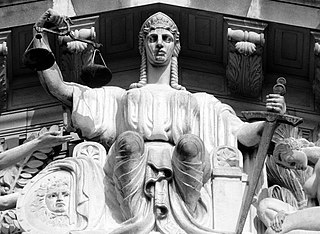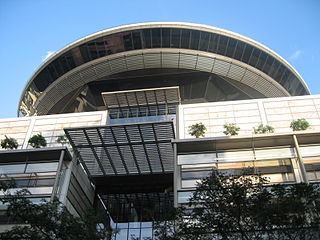
In English law, natural justice is technical terminology for the rule against bias and the right to a fair hearing. While the term natural justice is often retained as a general concept, it has largely been replaced and extended by the general "duty to act fairly".
Public-interest immunity (PII), previously known as Crown privilege, is a principle of English common law under which the English courts can grant a court order allowing one litigant to refrain from disclosing evidence to the other litigants where disclosure would be damaging to the public interest. This is an exception to the usual rule that all parties in litigation must disclose any evidence that is relevant to the proceedings. In making a PII order, the court has to balance the public interest in the administration of justice and the public interest in maintaining the confidentiality of certain documents whose disclosure would be damaging. PII orders have been used in criminal law against large organised criminal outfits and drug dealers where the identity of paid police informants could be at risk.
District of Columbia Court of Appeals v. Feldman, 460 U.S. 462 (1983), was a case decided by the United States Supreme Court in which the Court enunciated a rule of civil procedure known as the Rooker-Feldman doctrine. The doctrine holds that lower United States federal courts may not sit in direct review of state court decisions.

The doctrine of legitimate expectation was first developed in English law as a ground of judicial review in administrative law to protect a procedural or substantive interest when a public authority rescinds from a representation made to a person. It is based on the principles of natural justice and fairness, and seeks to prevent authorities from abusing power.
Judicial deference is the condition of a court yielding or submitting its judgment to that of another legitimate party, such as the executive branch in the case of national defense. It is most commonly found in countries, such as the United Kingdom, which lack an entrenched constitution, as the essential purpose of such documents is to limit the power of the legislature.

Nicholson v Haldimand-Norfolk Reg Police Commrs, [1979] 1 SCR 311, is a leading decision of the Supreme Court of Canada in Canadian administrative law. The decision was a landmark reform of administrative law, in which the Court significantly increased the degree of court intervention on procedural grounds.
Judicial review is a part of UK constitutional law that enables people to challenge the exercise of power, often by a public body. A person who feels that an exercise of power is unlawful may apply to the Administrative Court for a court to decide whether a decision followed the law. If the court finds the decision unlawful it may have it set aside (quashed) and possibly award damages. A court may impose an injunction upon the public body.

Council of Civil Service Unions v Minister for the Civil Service [1984] UKHL 9, or the GCHQ case, is a United Kingdom constitutional law and UK labour law case that held the royal prerogative was subject to judicial review.

United Kingdom administrative law is part of UK constitutional law that is designed through judicial review to hold executive power and public bodies accountable under the law. A person can apply to the High Court to challenge a public body's decision if they have a "sufficient interest", within three months of the grounds of the cause of action becoming known. By contrast, claims against public bodies in tort or contract are usually limited by the Limitation Act 1980 to a period of 6 years. Almost any public body, or private bodies exercising public functions, can be the target of judicial review, including a government department, a local council, any Minister, the Prime Minister, or any other body that is created by law. The only public body whose decisions cannot be reviewed is Parliament, when it passes an Act. Otherwise, a claimant can argue that a public body's decision was unlawful in five main types of case: (1) it exceeded the lawful power of the body, used its power for an improper purpose, or acted unreasonably, (2) it violated a legitimate expectation, (3) failed to exercise relevant and independent judgement, (4) exhibited bias or a conflict of interest, or failed to give a fair hearing, and (5) violated a human right. As a remedy, a claimant can ask for the public body's decisions to be declared void and quashed, or it could ask for an order to make the body do something, or prevent the body from acting unlawfully. A court may also declare the parties' rights and duties, give an injunction, or compensation could also be payable in tort or contract.

The United Kingdom constitutional law concerns the governance of the United Kingdom of Great Britain and Northern Ireland. With the oldest continuous political system on Earth, the British constitution is not contained in a single code but principles have emerged over the centuries from statute, case law, political conventions and social consensus. In 1215, Magna Carta required the King to call "common counsel" or Parliament, hold courts in a fixed place, guarantee fair trials, guarantee free movement of people, and free the church from the state; it also enshrined the rights of "common" people to use the land. After the English Civil War and the Glorious Revolution 1688, Parliament won supremacy over the monarch, as well as the church and the courts, and the Bill of Rights 1689 recorded that the "election of members of Parliament ought to be free". The Act of Union 1707 unified England, Wales and Scotland, while Ireland was joined in 1800, but the Republic of Ireland formally separated between 1916 and 1921 through bitter armed conflict. By the Representation of the People Act 1928, almost every adult man and woman was finally entitled to vote for Parliament. The UK was a founding member of the International Labour Organization (ILO), the United Nations, the Commonwealth, the Council of Europe, and the World Trade Organization (WTO). The principles of parliamentary sovereignty, the rule of law, democracy and internationalism guide the UK's modern political system.

Bias is one of the grounds of judicial review in Singapore administrative law which a person can rely upon to challenge the judgment of a court or tribunal, or a public authority's action or decision. There are three forms of bias, namely, actual, imputed and apparent bias.

The doctrine of legitimate expectation in Singapore protects both procedural and substantive rights. In administrative law, a legitimate expectation generally arises when there has been a representation of a certain outcome by the public authorities to an individual. To derogate from the representation may amount to an abuse of power or unfairness. The doctrine of legitimate expectation as a ground to quash decisions of public authorities has been firmly established by the English courts. Thus, where a public authority has made a representation to an individual who would be affected by a decision by the authority, the individual has a legitimate expectation to have his or her views heard before the decision is taken. Alternatively, an individual may also have a legitimate expectation to a substantive right. The recognition of substantive legitimate expectations is somewhat controversial as it requires a balancing of the requirements of fairness against the reasons for any change in the authority's policy. This suggests the adoption of a free-standing proportionality approach, which has been said not to apply in administrative law.
Johnson v Unisys Limited [2001] UKHL 13 is a leading UK labour law case on the measure of damages for unfair dismissal and the nature of the contract of employment.

Administrative law in Singapore is a branch of public law that is concerned with the control of governmental powers as exercised through its various administrative agencies. Administrative law requires administrators – ministers, civil servants and public authorities – to act fairly, reasonably and in accordance with the law. Singapore administrative law is largely based on English administrative law, which the nation inherited at independence in 1965.
Fettering of discretion by a public authority is one of the grounds of judicial review in Singapore administrative law. It is regarded as a form of illegality. An applicant may challenge a decision by an authority on the basis that it has either rigidly adhered to a policy it has formulated, or has wrongfully delegated the exercise of its statutory powers to another body. If the High Court finds that a decision-maker has fettered its discretion, it may hold the decision to be ultra vires – beyond the decision-maker's powers – and grant the applicant a suitable remedy such as a quashing order to invalidate the decision.

Procedural impropriety in Singapore administrative law is one of the three broad categories of judicial review, the other two being illegality and irrationality. A public authority commits procedural impropriety if it fails to properly observe either statutory procedural requirements, or common law rules of natural justice and fairness.

An ouster clause or privative clause is, in countries with common law legal systems, a clause or provision included in a piece of legislation by a legislative body to exclude judicial review of acts and decisions of the executive by stripping the courts of their supervisory judicial function. According to the doctrine of the separation of powers, one of the important functions of the judiciary is to keep the executive in check by ensuring that its acts comply with the law, including, where applicable, the constitution. Ouster clauses prevent courts from carrying out this function, but may be justified on the ground that they preserve the powers of the executive and promote the finality of its acts and decisions.
Louisiana Power & Light Co. v. City of Thibodaux, 360 U.S. 25 (1959), was a case in which the Supreme Court created a new doctrine of abstention.
Chief Constable of the North Wales Police v Evans [1982] UKHL 10 is a UK constitutional law case, concerning judicial review.

R v Criminal Injuries Compensation Board ex parte A was a 1999 case in the United Kingdom where a decision by the Criminal Injuries Compensation Board (CICB) not to award compensation was quashed by the House of Lords as it was deemed to be a breach of the rules of natural justice. The case reaffirmed the principle of "misunderstanding or ignorance of an established and relevant fact" and further developed the doctrine of error of fact; in that a decision could be quashed on the basis of it having taken into account a factual mistake. The case also dealt with the issue of undue delay and guiding principles were laid out.











